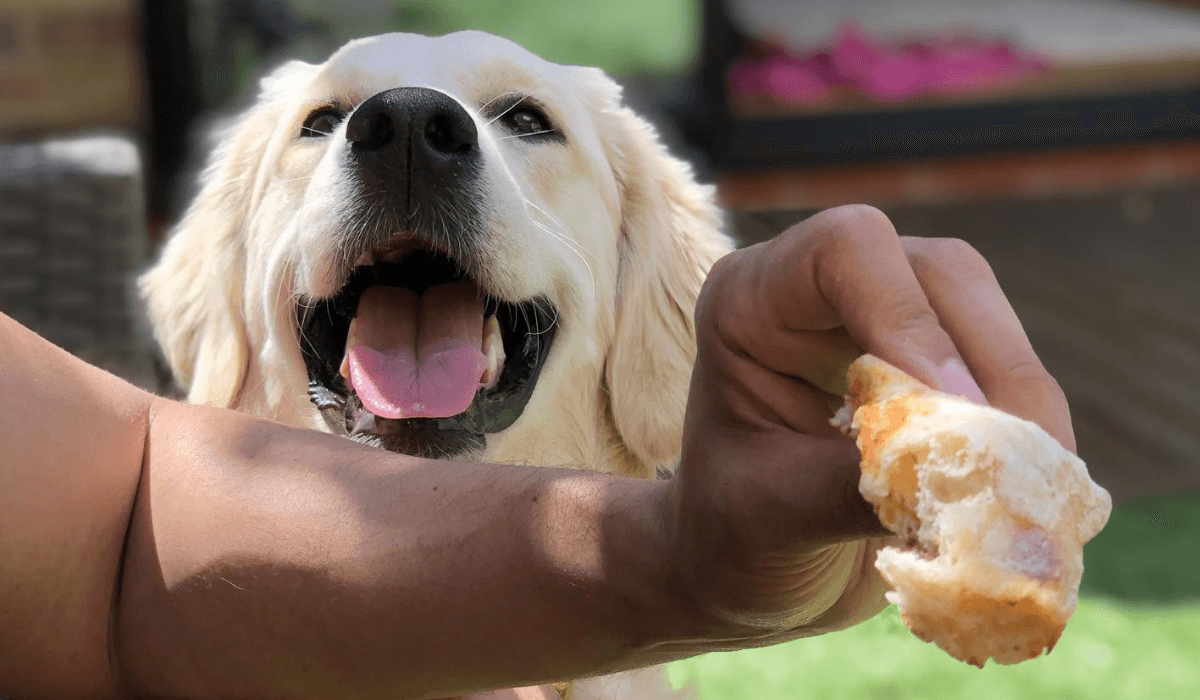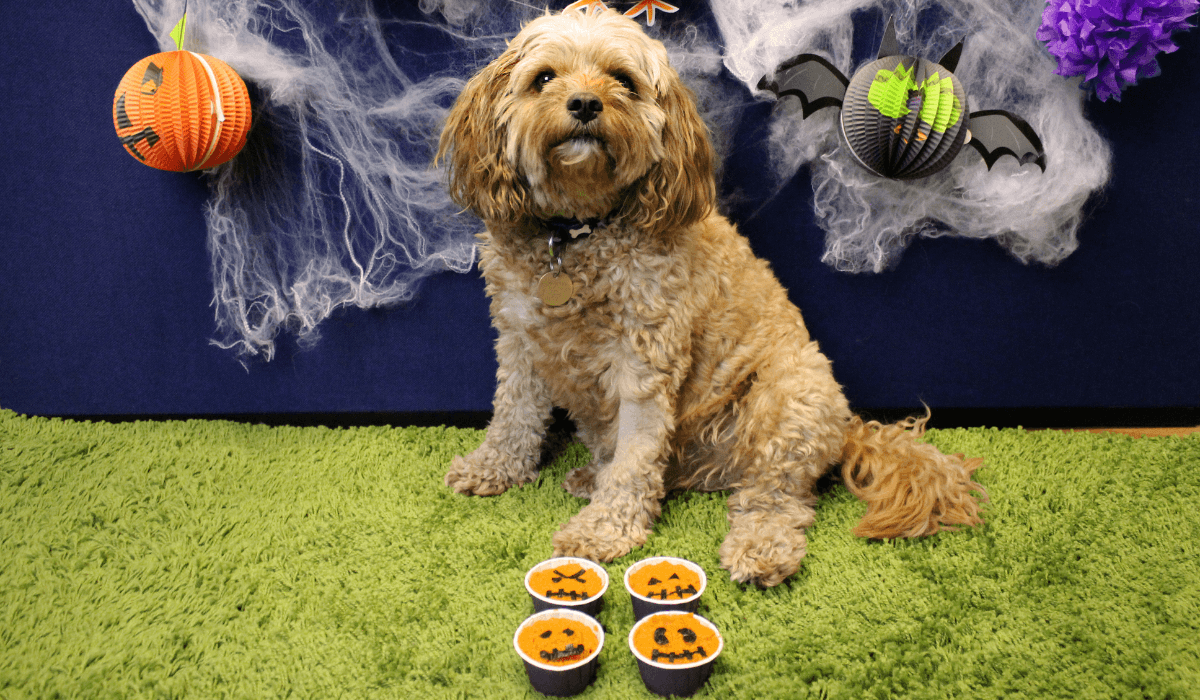We know that a healthy dog is a happy dog. Every now and again our pawsome pals deserve a tasty treat, and this may mean some human food…
However, especially for a new owner or borrower, it’s not always clear what food dogs can and can’t eat. To make things a little easier, we're sharing some common foods your dog should and shouldn’t eat. Take a look below.
Summary
Can dogs eat apples?
Dogs can safely eat fresh, ripe apples, but be sure to wash them and remove the core and seeds before letting them have a crunch!
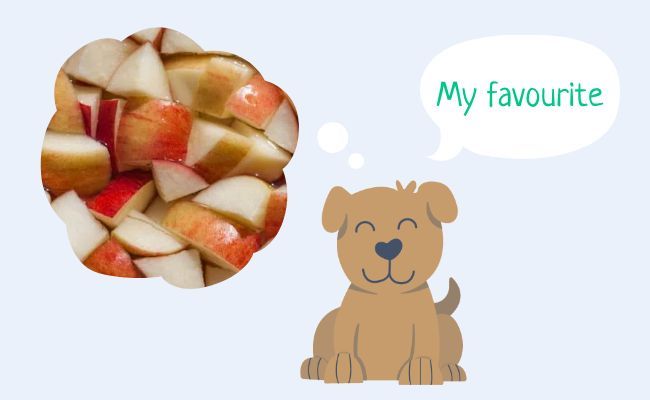
Are apples good for dogs?
- Apples are a great source of vitamin C and fibre.
- They are low in protein, cholesterol, sodium and fat, which is particularly helpful for older dogs who want a tasty treat.
What to watch out for when feeding apples to your dog?
- Apples are super sweet and tasty, so be careful not to give your dog too much, as this sugar can cause your dog to gain weight.
- Always remove the apple core and seeds before giving your dog a piece of yummy apple. The core can cause a gut obstruction, as can the seeds in very small dogs. The seeds of apples also contain very small amounts of cyanide, and while a few seeds shouldn’t be enough to be toxic, it is best to avoid giving your dog any apple seeds.
- Eating too much apple can give your dog a sore stomach or diarrhoea.
- Some dogs like to pick up rotten apples in the garden or on a walk. As well as the risks from the core and the seeds, these apples can be toxic if they are mouldy or can cause alcohol poisoning if they have fermented. So be careful to look out for apple trees on summer and autumn orchard walks.
- Applesauces can contain added sugar or harmful sweeteners, so be sure to choose unsweetened applesauce and make sure it has no additives.
How can I feed my dog apples?
- Always try your dog with a very small amount of any new food a few times to make sure they don’t get any bad reactions before giving them any more.
- Give apples a good clean before giving to your dog, then one to three slices of apple a day, depending on your dog’s size, is enough. Your dog might want more, but too much apple can upset their tums!
- Check out our oatmeal and apple biscuits recipe if your dog loves the taste of apple.
Can dogs eat avocado?
No, dogs should not eat avocado, as they can cause upset stomachs, can be potentially toxic, and as there are so many other food options available, it is simply best to avoid them.
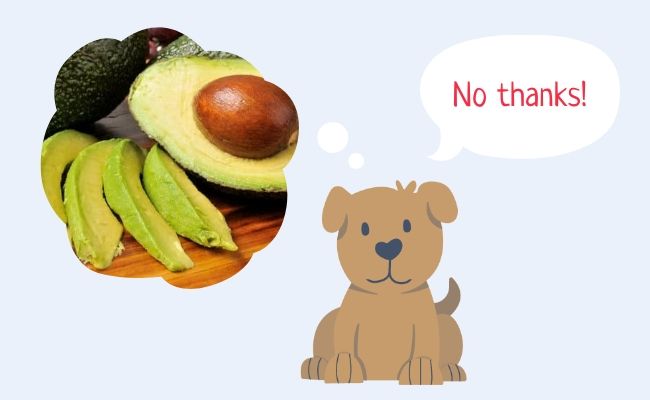
Why should you not give your dog avocado?
- Avocados contain a potentially toxic substance called persin. It is mostly found in the skin, stone, bark and leaves of an avocado plant and these must be avoided. The skin and the stone can also cause choking or a gut obstruction.
- There is no exact measure of how much avocado is safe for your dog (although studies suggest dogs are less sensitive to persin than other animals).
- The Veterinary Poisons Information Service states that a small amount of avocado should not usually be toxic, but it can cause an upset stomach.
- Avocado is very high in fat, so it can lead to weight gain in dogs and can upset stomachs. It should particularly be avoided in dogs who have had pancreatitis before, or breeds that are prone to this painful condition (which can include miniature schnauzers and cocker spaniels).
- Many avocado containing products, like guacamole, can contain ingredients harmful to dogs, like onions, garlic and lime juice.
- One study suggests that eating avocado over a long period of time caused heart disease in two dogs.
What to do if your dog has eaten avocado?
- Usually if your dog has eaten some avocado flesh the most they will experience is an upset stomach. But remember, all of our dogs are different and react differently, so if your dog has eaten avocado and you are in any way concerned, contact your vets.
- Always contact your vets if they have eaten any part of the plant or the stone.
Can dogs eat bananas?
Dogs can safely eat bananas in moderation, but be sure to remove the peel before they tuck in!

Are bananas good for dogs?
- Bananas are a pawsome source of fibre, potassium, vitamins B6 and C, and other antioxidants.
- They are also low in sodium and fat.
What to watch out for when feeding banana to your dog?
- Bananas are high in sugar, which can lead to weight gain, so make sure to only feed them in moderation.
- If your pooch eats too much banana, the high levels of fibre and sugar can cause an upset stomach and diarrhoea!
- Although the peels are not toxic to dogs, the high level of fibre in them makes them difficult to digest and can cause a dangerous gut obstruction. So always remove the peel before giving some banana to your dog.
How can I feed my dog bananas?
- Like any food some dogs won’t tolerate bananas, so always try a small amount the first few times they have it to see how they respond.
- If, after you’ve tried with a small amount, your dog is enjoying their new tasty treat, and their guts are happy, then a large dog can get up to half a banana a day, and a small dog two to three small pieces.
- Make sure to chop up into manageable chunks depending on their size.
- Check out our banana bread recipe for a doggy-friendly way for your pup to enjoy some lovely banana goodness.
Can dogs eat blueberries?
Yes, fresh or frozen blueberries can be enjoyed by your dog!

Are blueberries good for dogs?
- Blueberries are not only super yummy, but they are also packed with antioxidants, vitamins C and K, fibre and phytochemicals which can support your dog’s health.
- They are also a low calorie treat!
What to watch out for when feeding blueberries to your dog?
- Like any sweet treat, they should be fed in moderation, so they don’t cause weight gain.
- Eating too many blueberries can also cause upset stomachs and diarrhoea.
- You should avoid canned blueberries, and stick to the fresh or frozen. Blueberries in tins can contain toxic artificial sweeteners like xylitol.
- Blueberry skins don’t always digest properly, so eating blueberries can make your dog’s poo look darker than normal. Dark poo can also be caused by gut problems, so if you are concerned contact your vet for advice.
How can I feed my dog blueberries?
- Try your dog with a small amount the first few times, to make sure they don’t get an upset tummy or an allergic reaction.
- Make sure your blueberries are washed before giving them to your pup and remove any stalks.
- Larger dogs can have up to 50 blueberries a day, but always be sure to watch your dog’s weight and reduce the amount of other foods when adding in a new treat. For small dogs they can enjoy up to 10 a day.
- Check out our recipes for dog-friendly blueberry and chicken pies, blueberry biscuit bones and blueberry crunch dog treats!
Can dogs eat broccoli?
Broccoli can be enjoyed by your dog in small amounts.

Is broccoli good for dogs?
- Broccoli is a good source of fibre, biotin, vitamins A, B6, B9, B12, D, E and K and minerals including potassium and magnesium.
What to watch out for when feeding broccoli to your dog?
- Broccoli florets contain isothiocyanates which can irritate your dog’s stomach if they eat a bit too much. In even larger quantities, these isothiocyanates can be toxic, so be sure to only feed small amounts of broccoli to your pooch.
- Break broccoli up into bite-sized pieces, especially when raw, to avoid the risk of choking. Large pieces of broccoli, particularly the stalk, are difficult to digest and can cause gut obstruction.
- Don’t add any seasoning or flavouring to the broccoli.
- High fibre foods like broccoli can make your dog a little gassy, so be prepared for that, and if what they pass smells particularly unpleasant, contact your vet to make sure that there isn’t something else going on.
How can I feed my dog broccoli?
- Like any food, some dogs won’t tolerate broccoli, so always try a small amount the first few times they have it to see how they get on. If you have any concerns, contact your vet.
- If you are cooking the broccoli, make sure not to add any salt, flavouring or sauces during the cooking process or after.
- Wash broccoli well before feeding to your dog and always chop into small bite-size pieces.
- How much your dog can have depends on their size, but never give more than 10% of your dog’s meal as broccoli.
Can dogs eat carrots?
Yes, carrots are a fantastic crunchy treat for your pooch!

Are carrots good for dogs?
- Carrots contain vitamins including Vitamin A, B6, C and K1, potassium, and fibre.
- They are a great low calorie snack.
What to watch out for when feeding carrots to your dog?
- Carrots contain sugar, so like anything sweet, feeding too many can lead to weight gain.
- Eating too many carrots can also result in a bit too much fibre in your pup’s diet, resulting in upset stomachs and gas.
- As long as they are nice and clean, fresh carrots cooked or raw are a tasty treat. If cooking them make sure not to add any salt or flavouring. Frozen carrots can be great too!
- Avoid tinned carrots, as these can often have salt and preservatives.
- Juicing carrots can lose a lot of their fibre and the fun cronch a lot of our pups enjoy!
How can I feed my dog carrots?
- Always try your dog with a small amount of carrot the first few times, to make sure they don’t get an upset tummy or an allergic reaction. If you have any worries, contact your vet.
- Clean and chop carrots into bite-sized pieces for your pup to enjoy.
- Some dogs prefer carrots cooked, some raw, both are nutritious ways to feed them.
- Large dogs can enjoy a full carrot a day chopped up into manageable chunks, while for smaller dogs, go for two to three baby carrots or a third of a large carrot.
- Why not treat your pooch to some carrot pupcakes or cheese and carrot illusion cakes?
Can dogs eat cheese?
Some cheeses can be a tasty treat for dogs in moderation.

Is cheese good for dogs?
- Cheese can be a source of calcium, phosphorus, zinc, vitamins A, B12, protein and essential fatty acids.
What to watch out for when feeding cheese to your dog?
- Cheese is often high in calories, so don’t feed too much as it can cause your dog to gain weight. This high fat content can also trigger a serious condition known as pancreatitis, a condition breeds including miniature schnauzers and cocker spaniels are particularly prone to.
- Some dogs cannot tolerate any dairy, so will get an upset tummy if they have any cheese, so it should be avoided altogether in these dogs. Even with dogs that are ok with dairy, too much cheese can give them a unhappy gut!
- Some cheese can be high in salt, which can be harmful to your pup.
- Never feed your dog blue cheese, as the fungus used to make these cheeses is often toxic to dogs. Contact your vet immediately if your dog has eaten blue cheese.
- Avoid cheeses with added ingredients like fruits, nuts, chives, herbs, garlic or onion. These can be toxic to your dog!
- Cheese sauces often contain a lot of extra ingredients including butter, salt and flavourings, so should be avoided in dogs.
How can I feed my dog cheese?
- Like any food, some dogs won’t tolerate cheese, so always try a small amount the first few times they have it to see how they get on, as some dogs may be allergic or intolerant to cheese. If you have any issues, contact your vet.
- The best cheeses to try are ones like plain cottage cheese or cream cheese, making sure there are no added flavourings like garlic or onion.
- How much cheese your dog can have in a day depends on how fatty the cheese is, and the size of your dog, but as a general rule a few small bites a day is enough.
- Why not try our cheese and carrot illusion muffins recipe?
Can dogs eat cucumbers?
Yes, cucumbers are a refreshing snack our dogs can enjoy!

Are cucumbers good for dogs?
- Cucumbers are full of water, which is great for keeping your pup hydrated on a hot day, as well as being a source of nutrients including vitamins B1, B5, B6, C, K, biotin, manganese, copper and potassium.
- They are also low in salt and calories!
What to watch out for when feeding cucumber to your dog?
- Avoid giving your dog pickled cucumbers, as these often contain harmful ingredients like onion, garlic and/or salt.
- Always feed cucumber in moderation, as too much cucumber can result in upset stomachs.
- Some dogs with sensitive tummies find the seeds and skin of a cucumber too hard to digest, and this can give them gut upsets.
How can I feed my dog cucumber?
- As with any new food, always try a small amount first a few times to see if your dog can tolerate cucumber and doesn’t have an allergic reaction or an upset stomach. If your pooch has a sensitive tummy, it might help to remove the seeds and skin.
- Always wash cucumbers when preparing for your pup, to wash off any dirt or pesticides.
- Chop up a cucumber into bite-size pieces for small dogs or super quick eaters. You can also cut cucumber into sticks, based on your dog’s size, and freeze them for a treat on a hot day.
- One to two slices of cucumber a day is an ideal amount for pups, giving too much can cause an upset tum.
Can dogs eat grapes?
No, dogs should never eat grapes or raisins, sultanas or currants (dried grapes).
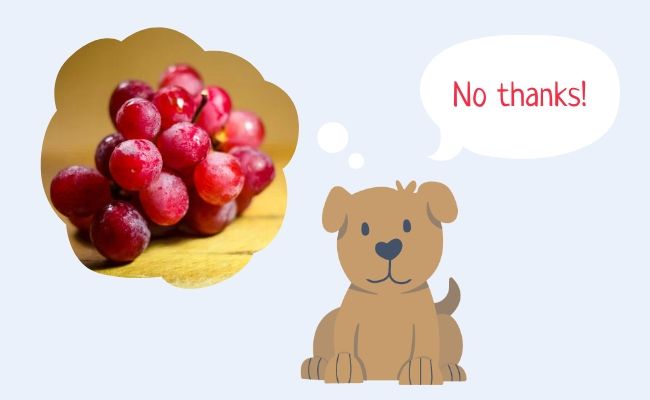
How are grapes, raisins, sultanas and currants bad for dogs?
- It is not known exactly which substance it is in grapes that is toxic to dogs.
- Eating them can cause kidney failure.
- There is no “safe amount” of grapes, raisins, sultanas or currants that your dog can have. All colours of grape are unsafe and should be avoided.
- It doesn’t matter which breed or size your dog is, any amount of grapes, raisins, sultanas or currants can be toxic, as every dog can react differently.
- Anything containing grapes, raisins, sultanas or currants including drinks, cakes, fruit salads and trail mixes should be avoided.
What to do if your dog eats grapes, raisins, sultanas or currants?
- Call your vet immediately, letting them know when it was that your dog had the grapes, raisins, sultanas or currants if you know.
- Your vet can then advise on the best course of treatment which may involve you taking your dog to the vets immediately for them to make your dog sick and/or put them on fluids. DO NOT attempt to do these treatments yourself at home as this can be harmful to your dog.
- Your vet may also want to perform blood tests and/or other supportive treatments.
What are the signs of grape toxicity?
- Dogs can seem lethargic and weak
- They can be sick or have diarrhoea
- They may not want to eat, but may want to drink and pee a lot
- They may be uncomfortable if you touch their tummy
- They can become dehydrated, and then they will pass less or even no urine
If you see any of these signs you should contact your vet, especially if you think it is possible they could have eaten grapes, raisins, sultanas or currants.
Can dogs eat mango?
Mango is a tasty treat your pup can enjoy!
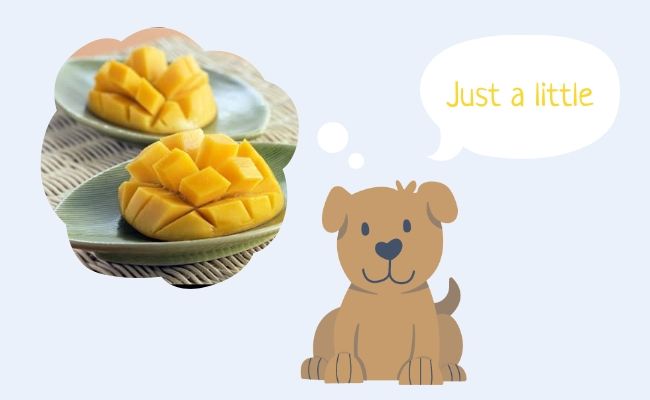
Is mango good for dogs?
- Mangoes contain fibre, vitamins A, B6, C, and E and minerals including potassium, calcium, and iron.
What to watch out for when feeding mango to your dog?
- Mango is super sweet and tasty, which means it’s quite high in sugar, so be sure to have it only as an occasional treat, as lots of sugar can lead to weight gain.
- Mango is high in fibre, so if you give too much your dog can get an upset tummy.
- Always remove the skin before giving mango to your dog. Although not toxic, it is very difficult to digest, can be a choking hazard and can cause a gut obstruction.
- Make sure to remove the stone too before giving mango to your dog. It can cause choking, a gut obstruction and, like a lot of fruit stones, contains a small amount of toxic chemical cyanide.
- Dried mango tends to have more sugar per portion, and is also less nutritious than fresh mango, so stick to fresh or frozen mango.
How can I feed my dog mango?
- Like any food, some dogs won’t tolerate mango, so always try a small amount the first few times they have it to see how they get on. If they have any reactions, be sure to contact your vet.
- Always wash a mango, like when preparing any other fruit, then remove the skin, the stone and cut it up into bite-size pieces.
- Depending on your dog’s size, they can enjoy from 30g to 60g of mango in a week.
- Frozen mango chunks can be a great treat on a hot, summer’s day!
Can dogs eat mushrooms?
Dogs can safely eat SOME mushrooms. For example, those bought in the shops should be safe, but don’t let them eat wild mushrooms as they can be toxic. If you are unsure on which type of mushroom you have, do not give it to your dog.
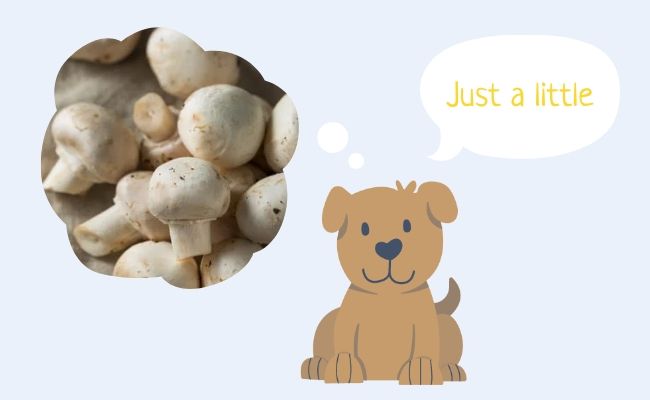
Which mushrooms are safe and which are toxic?
Every dog is different, but most should be able to tolerate the mushrooms in the safe list below. Avoid those in the toxic list. This list doesn’t include every type of mushroom, just common ones, as there are over 14000 species of mushroom in the world!
Safe list of mushrooms
- White button
- Cremini (white or chestnut mushrooms)
- Portobello
- Porcini
- Reishi
- Shiitake
- Maitake
Toxic list of mushrooms
- Death Cap (Amanita Phalloides)
- Fly Agaric (Amanita Muscaria) – the iconic fairy-tale mushroom with the red cap and white spots
- Deadly Webcap (Cortinarius Rubellus)
- Funeral Bell (Galerina Marginata)
- Destroying Angel (Amanita Virosa)
- Fool’s Funnel (Clitocybe Rivulosa)
- Panther Cap (Amanita Pantherine)
- Angel’s Wings (Pleurocybella Porrigens)
(Purina, 2022)
Are mushrooms good for dogs?
- Safe, shop bought mushrooms contain fibre, B vitamins, vitamin D and minerals including phosphorus and potassium.
- They are low in fat and salt.
What to watch out for with mushrooms?
- If your dog eats wild mushrooms on a walk or in the garden, always contact your vet immediately. Unless you are a confident mycologist, do not try to identify the mushroom yourself. If possible and there is no risk to yourself, take a photo and/or pick and take the type of mushroom your dog has eaten to the vet to help identify it. Some mushrooms can be very dangerous and toxic to dogs!
- Curious dogs will be tempted to try wild mushrooms, so always be sure to keep your dog on lead in dense wooded areas and clear any mushrooms from your garden.
- Mushrooms sold in shops tend to be safe for our dogs, when fed in moderation, but be sure to avoid the butter, oils, sauces, garlic, onion and seasoning they are often cooked with.
What are the signs of mushroom toxicity?
- Dogs can have sickness, diarrhoea and/or have a sore abdomen
- They can produce more saliva which will make them drool more
- Dogs can become tired and weak, and be wobbly on their legs
- Some dogs can get fits from mushroom toxicity
If you see any of these signs you should contact your vet, especially if you think it is possible your dog could have eaten wild mushrooms.
How can I feed my dog shop bought mushrooms?
- Like any food, some dogs won’t tolerate mushrooms, so always try a small amount of shop bought mushrooms, of a safe species, the first few times they have them to see how they get on. If there are any issues, contact your vet.
- A lot of dogs don’t like the taste or consistency of mushrooms, so will often not be interested.
- Wash mushrooms well before giving them to your dog, and make sure they are chopped into bite-sized pieces.
- They can be eaten raw or cooked, as long as no flavours or additives have been added in.
- If you can’t be sure what type of mushroom you have, do not feed it to your dog, it’s much better for them to go without!
Can dogs eat onions?
No, dogs should never eat onion in any form. Other members of the allium family - spring onions, chives, shallots, leeks and garlic, should be avoided too for the same reasons.
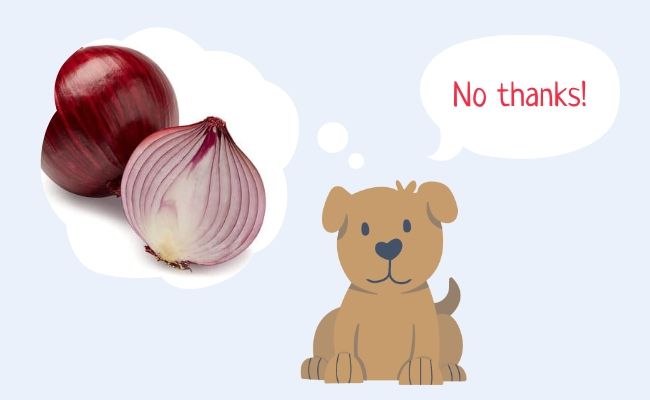
How are onions bad for dogs?
- Onions contain a substance called N-propyl disulphide which is toxic to dogs. N-propyl disulphide damages red blood cells, which can then lead to a dangerous anaemia.
- It only takes a small amount of onion to cause toxic effects. According to the American Kennel Club, just 100g of onion can be toxic to a 20kg dog, so it’s best to just avoid onion altogether. Even if your dog has eaten less than this, you can call your vet for advice, as some breeds, including Japanese Akitas and Shiba Inus, can be more prone to onion toxicity.
- Onion, onion juice and onion powders can be found in lots of different ready meals, sauces, soups, fried foods etc so be sure to avoid them all.
- The leaves of onion plants are also toxic, so keep your pooch away from those plants in the garden.
What to do if your dog eats anything containing onions?
- Call your vet immediately, letting them know when it was your dog ate it, and how much your dog has eaten.
- Your vet can then advise on the best course of treatment which may involve you taking them to the practice to make your dog sick. Making your dog sick is only successful if done soon after they have eaten onion, so always call your vet straight away!
- Your vet may also want to take blood samples, give supportive treatment which may include fluids and/or give a blood transfusion if required.
- DO NOT attempt to try any of these treatments yourself at home, as this can be harmful to your dog.
What are the signs of onion toxicity?
It can take up to a few days for signs of onion toxicity to appear. These signs can include:
- Your dog may seem weak and tired, and can collapse
- Their gums can look paler than their normal pink colour
- Your dog may not want to eat, and have bouts of sickness and/or diarrhoea
- You may also notice that your dog’s heart is beating faster and that they are panting more
- Some dogs can also seem uncomfortable and unsettled
If you see any of these signs you should contact your vet, especially if you think it is possible they could have eaten onions.
Can dogs eat oranges?
Yes, dogs can eat small amounts of orange as long as pith, seeds and peel are removed.
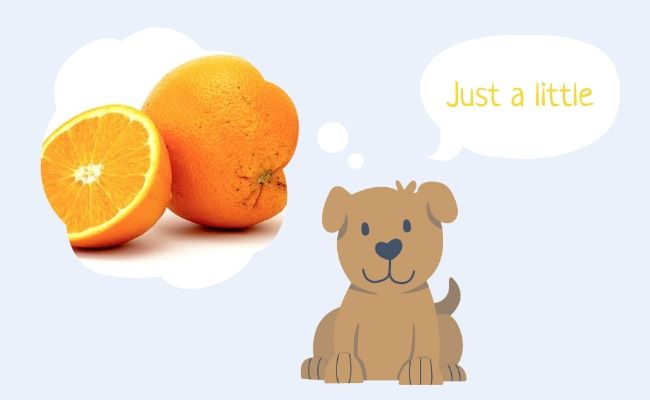
Are oranges good for dogs?
- Oranges are a great source of vitamin C, potassium and fibre.
- They are also low in sodium.
What to watch out for when feeding oranges to your dog?
- Like many fruits, the seeds in oranges contain a very small amount of a toxic chemical called cyanide. Although a few seeds should not be enough to cause an issue, they should be avoided. The seeds can also potentially cause obstruction in the gut, especially in small dogs.
- Make sure your dog doesn’t eat the orange peels or pith as they can cause a gut obstruction and be a choking hazard.
- Oranges contain sugar, which can lead to weight gain, so make sure to only feed them in moderation. Because of this sugar, diabetic dogs should avoid oranges altogether.
- As oranges are quite acidic they can lead to sore stomachs, so be sure not to feed too much.
- Avoid orange juice as it is usually too acidic for dogs and can upset their tummies, and can also contain additives and extra sugar.
How can I feed my dog oranges?
- Like any food some dogs won’t tolerate oranges, so always try a small amount the first few times they have it to see how they respond. If they have any issues, then contact your vet.
- Remove the peel, pith and seeds, and then small dogs, without sensitive stomachs, can be given 1-2 sections of a moderate-sized orange a day, while most larger dogs can enjoy 2-4 sections a day.
- Not all dogs enjoy the consistency or taste of orange, so don’t be upset if your pooch turns their nose up at this citrus treat.
Can dogs eat pineapple?
Yes, raw pineapple is a great sweet treat for dogs, as long as you remove the skin and the core.

Is pineapple good for dogs?
- Pineapple is a great source of minerals including manganese, copper, potassium, magnesium and iron.
- It also contains fibre and has a high water content.
What to watch out for when feeding pineapple to your dog?
- Pineapple is sweet and tasty, so contains quite high levels of sugar. To avoid too many extra calories, feed in moderation.
- Avoid canned pineapple, as it can often be in syrup, which is too much sugar for our canine companions.
- Dried pineapple is not recommended either, as the portion size tends to be too much sugar for our pups.
- The core, skin and leaves of a fresh pineapple can cause gut obstruction.
- Always chop up pineapple into small, manageable pieces, so that your pooch’s pineapple treat isn’t a choking hazard.
How can I feed my dog pineapple?
- Like any food some dogs won’t tolerate pineapple, so always try a small amount the first few times they have it to see how they respond. If they have any issues then contact your vet.
- Cut away the core, skin and leaves of the pineapple, and just give your dog the soft fleshy bit in bite-sized bits.
- Small dogs can be given 2-3 small chunks of pineapple a day while most larger dogs can enjoy 3-4 small chunks. You can freeze pineapple chunks for a tasty summer treat.
- Does your dog love pineapple? Why not make a dog-friendly pineapple pupside down cake?
Can dogs eat strawberries?
Yes, fresh or frozen, strawberries are a tasty, low-calorie treat for your dog to enjoy.

Are strawberries good for dogs?
- Strawberries (as well as being super tasty!) are packed full of antioxidants, potassium, vitamin C and fibre.
- They are also low in calories.
What to watch out for when feeding strawberries to your dog?
- Strawberries can be sweet, and that means sugar, which can lead to weight gain, so only feed them in moderation.
- You should only give your dog fresh or frozen strawberries. You should avoid canned strawberries as they can contain harmful artificial sweeteners like xylitol, which can be toxic to dogs.
- Always wash strawberries before eating to remove any pesticides.
- Although not toxic, and a rare issue, be sure to remove strawberry tops before letting your pup have a chomp as there is a small risk of gut obstruction.
How can I feed my dog strawberries?
- As with any new food, always try a small amount first a few times to see if your dog can tolerate (and likes the taste of!) strawberries, and doesn’t have an allergic reaction or an upset stomach.
- Always give fresh strawberries a good wash before eating, and be sure to remove the stems.
- Larger dogs can cope with a whole or halved strawberry at a time. To avoid the risk of a strawberry being a choking hazard for an enthusiastic puppy make sure to cut into smaller pieces or mash up to make a puree. Small dogs can have one strawberry a day (cut up to bite size pieces), and large dogs can enjoy up to five strawberries a day!
- Check out our berry almond cake recipaws for a fun strawberry based treat for your pooch!
Can dogs eat sweetcorn?
Sweetcorn is a tasty treat our pups can enjoy, as long as it’s taken off the cob!
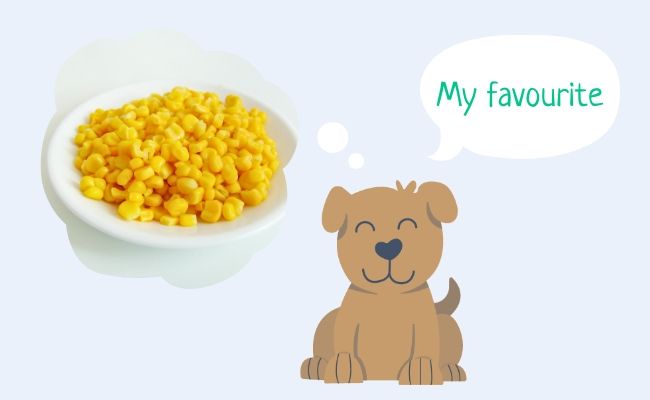
Is sweetcorn good for dogs?
- Sweetcorn kernels contain fibre, essential fatty acids, B vitamins, vitamin C, magnesium and potassium.
- Sweetcorn is also low in fat and salt.
What to watch out for when feeding sweetcorn to your dog?
- Always remove the cob before feeding sweetcorn to your dog. Pieces of corn cobs can be a choking hazard and cause obstructions in the gut.
- The name might give this one away, “sweet”corn has quite a lot of sugar in it, so to avoid gaining weight, only feed your dog a small amount.
- Sweetcorn may not always digest completely in your dog’s stomach, so you may see some bits in their poo.
- Canned sweetcorn can have added salt, so it’s best to stick to the fresh or frozen options.
- Avoid sweetcorn husks, dog’s cannot digest these well and they can cause gut obstructions.
How can I feed my dog sweetcorn?
- Like any food, some dogs won’t tolerate sweetcorn, so always try a small amount the first few times they have it to see how they get on. If they have any issues, contact your vet.
- After cooking the corn cob, use a knife to remove some kernels or cook up some fresh or frozen corn kernels which can be added to your dog’s meal, but be sure to avoid any seasoning, butter or oils.
- How much to give your dog depends on their size, but make sure that sweetcorn isn’t more than 10% of their meal.
Can dogs eat tomatoes?
Fresh, ripe, red tomatoes can be enjoyed by dogs, but be very careful to avoid stems, leaves and green tomatoes.
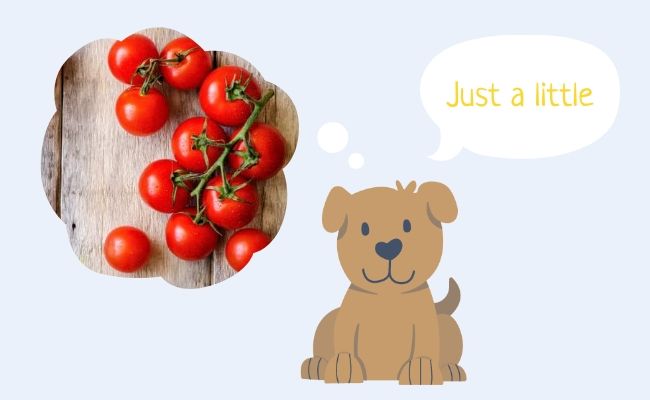
Are tomatoes good for dogs?
- Tomatoes are sources of antioxidants fibre, vitamins A, B, C, K, calcium, potassium and iron.
- They are also low in protein and calories, which is great for older pooches!
What to watch out for when feeding tomatoes to your dog?
- Dogs should only ever eat the fleshy parts of red, ripe tomatoes.
- Substances called solanine and tomatine are found at a toxic level in the leaves and stems of tomatoes, as well as in unripe tomatoes. So make sure to keep tomato plants out of reach! Once tomatoes are ripe and red, the levels of these substances in the fleshy part of the tomato is no longer dangerous to dogs. If you suspect your dog has eaten tomato stems or leaves or green tomatoes contact your vet immediately.
- Ripe, red tomatoes should be fed in moderation as they can cause upset stomachs if your pup eats too much.
- Avoid tomato sauces, soups or tinned tomatoes as they can often include preservatives or additives like garlic, onion or salt, which can be dangerous for your dog.
How can I feed my dog tomatoes?
- As with any new food, always try a small amount first a few times to see if your dog can tolerate tomatoes and doesn’t have an allergic reaction or an upset stomach.
- Always give fresh, ripe tomatoes a good wash before eating, and be sure to remove the stems and leaves.
- One large, or two small tomatoes should be enough for the average size dog over a week, but make sure to chop them up into manageable pieces that won’t be choking hazards.
- A lot of dogs don’t enjoy the texture of tomatoes, so don’t be disappointed if your pup thinks they’re a bit ruff.
Can dogs eat watermelon?
Yes, watermelon is a tasty treat for our pups to enjoy.

Is watermelon good for dogs?
- Watermelon is a great source of vitamins A, B6, C, potassium, fibre and (you might have guessed from the name!) has lots of water in it too, which can help your pooch stay hydrated.
- It is also low in calories and sodium.
What to watch out for when feeding watermelon to your dog?
- Any food on top of your dog’s normal food, adds calories to their daily intake, so don’t feed too much so they don’t gain weight.
- Watermelon flesh is safe for dogs but avoid the seeds. Although the seeds are not toxic, they can cause gut obstructions, particularly in small dogs, so remove them before letting your pup tuck in.
- The skin should be removed too before giving watermelon to your dog. It is really difficult for our pups to digest, and can cause a gut obstruction.
- Too much watermelon can cause your pooch to have an upset tummy.
How can I feed my dog watermelon?
- Like any food, some dogs won’t tolerate watermelon, so always try a small amount the first few times they have it to see how they get on. If they have any issues, then call your vet.
- Remove the seeds and chop the watermelon flesh into manageable pieces for your dog to enjoy. A few chunks a day is enough for a small dog, while larger dogs can have up to a slice (cut into manageable pieces with seeds and skin removed).
- Frozen watermelon can be a cool snack for a hot day - especially in pupsicle form!
Information on this page should never replace advice given by your veterinarian. If you ever have any concerns about a food your pet has eaten or if they have any tummy upsets or signs of an allergic reaction etc., contact your local vet. If you’re a premium BorrowMyDoggy member you can use our 24/7 Vetline for further advice on your dog’s diet. Find the number on your homepage.
Always be sure to remember that no more than 10% of your dog's calorie intake should come from anything other than their nutritionally balanced, regular dog food.
Info on poisonous plants to dogs
Garden plants poisonous to dogs
What to do if your dog has food poisoning
Preventing herbicide poisoning in dogs
Protecting your dog from pests and insect
10 springtime hazards for dogs
